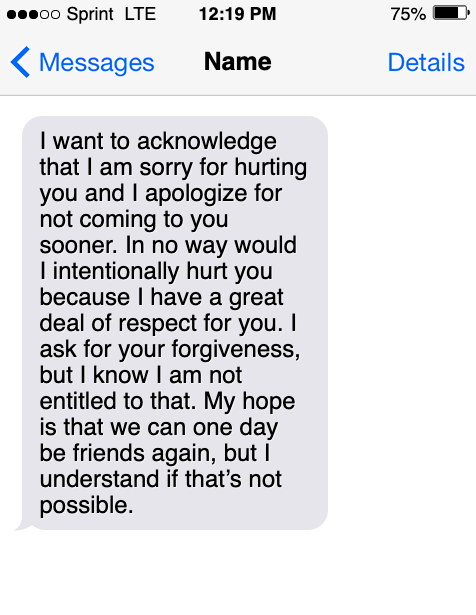About this time a few years ago, I was working on a piece for a magazine, in which I was interviewed about my experience with sexual assault and harassment.
It was not the first time I had to relive my trauma, nor was it the last. I will never stop having to relive it. I remember sitting there with the interview questions day after day as the deadline steadily grew closer just trying to work up the motivation and courage to speak about the article.
One of the questions regarded an experience I had with someone I once considered a friend. The question asked how I was handling sharing my experience publicly. Honestly, that article was the most public I had ever gone with my story about him, and I still couldn’t bring myself to publicly name my rapist in that breath. I had no doubt who it was who raped me, but I just wasn’t ready for all the backlash that would come from dragging his name through the mud.
I decided it was enough to at least get my story out there, and, if anyone asked me personally, I could choose whether to trust them with the full details.
A few months ago, I had to relive it all over again. It seems that right around the same time, in multiple places around the country, victims of sexual assault all began to speak up in unison and call out their aggressors. Where I live was one of those places. I believe that once everyone was confined to their homes due to the pandemic, anything they could have otherwise turned a blind eye to and muted with social gatherings or other activities was forced into the light as people were forced to sit with themselves.
Women I knew began to share their stories. The names of the people coming out as predators or rapists were names I was all too familiar with, and as I shared my own story, I was horrified to hear his name repeated in other women’s stories, over and over again.
I had to recall how it felt waking up to him inside of me. I had to remind myself that I still drove him to work once he woke up and found me laying petrified on the couch because that was as far as I could get away while he remained in my bed.
I had to reawaken the emotions I felt as I sat there, frozen in my car after dropping him off, unable to move or even think until I was finally able to pick up my phone and call a close girlfriend. After a bit of prodding, she got me to reveal why I called her, and as I recapped everything that had happened from the night before leading up to that phone call, she was the one to say it for me. I was raped.
This time, though, I also realized that many other women had to go through something so similar and feel how I did. I was livid. Maybe if any one of us had spoken up sooner, any one of us could have been spared. I wasn’t about to take that chance again. Finally, I publicly outed him.
A few days later, though, I received a text from an unknown number asking for me by name. I didn’t respond before I received a follow-up text telling me exactly what I feared: it was him. My number hadn’t changed, so he thought he’d try to contact me to offer an apology. I exclaimed that he would never find forgiveness from me and explained to him how I originally thought to reach out to him during the initial callouts until I came to the revelation that I was one of many.
I told him explicitly that I did not want his apology, over a text, nonetheless. He then proceeded to send me the following:
“I received your tweet notification and immediately froze up. I genuinely thought you and I were good. But looking back I now understand your feeling of disregard that I’ve never addressed your concern of me assaulting you to this point. Although it’s easy to chalk up past behaviors to being young, dumb, and most of all, a terrible drunk, I want you to know that I take responsibility for hurting you.
I remember we spoke the morning we woke up when you allowed me to stay over, I am sorry I didn’t make you feel at ease then. I’ve always appreciated you as a friend and respected your creativity and talent as an artist. I want to acknowledge that I am sorry for hurting you and I apologize for not coming to you sooner. In no way would I intentionally hurt you because I have a great deal of respect for you. I ask for your forgiveness, but I know I am not entitled to that. My hope is that we can one day be friends again, but I understand if that’s not possible.
Please know I appreciate all you’ve done to help me as you were always there for me and again. I am sorry for hurting you. You don’t have to accept my apology but I at least wanted to offer it.”
As I first read it, I thought maybe I should respond or even give him the chance to talk over the phone. The longer I sat with it, though, I realized that I did not owe him that. His apology was centered around how he was feeling as a result of my Tweets. He may have claimed to take responsibility for hurting me, but it was performative, at best.
He could not even fully admit that he raped me. He admitted even at the time and in the days following that he knew I was not okay with what had happened. I communicated to him that I was angry and upset and not okay with what happened, and we were never okay after that.
Maybe back then I would have heard him out. Maybe we could have even mended some semblance of a friendship again. But after I sat with it for so long, and after so many other women had reached out to me with their own experiences, there wasn’t a chance of that anymore.
First of all, you cannot force an apology onto your victims. If someone says they are unwilling or unable to hear you out, then you must live with that. If someone tells you that it is in their own best interest to not hear you out, whether that means for now or forever, then you don’t get to tell them it’s not. Forcing something unwanted onto that person is how you got into this mess in the first place.
Also, and this transcends apologies specifically for raping someone, you need to apologize for your exact actions. Generalizing your apology to say you’re sorry that person is concerned or hurt passes the blame onto either their emotions or some unseen force. Instead of only taking responsibility for hurting someone, because that could include anything from saying something mildly mean all the way to causing them physical and irreprovable harm, apologize for what you did. Raping someone is the latter, so do not make the mistake of lumping them together.
Acknowledge that you put yourself inside someone else’s body without their consent. Anything outside of these measures is merely apologizing for your own sake—to save face and make you feel better.
~


 Share on bsky
Share on bsky





Read 5 comments and reply